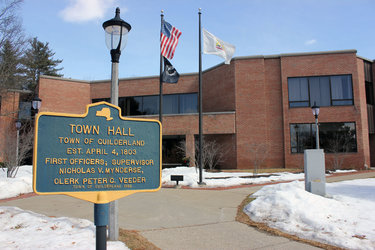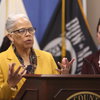Group aims to promote government transparency in Capital Region
ALBANY COUNTY — Although John Cashin, MaryLou Kling, and Robyn Gray live in different municipalities in the Capital Region, all three have had the same experience with local government: public officials aren’t transparent enough, and state law doesn’t do enough about it.
So, these three volunteered to be part of the Coalition for Open Government’s Capital Region advisory council, one installment of what coalition president Paul Wolf hopes will be several more throughout the state that will spread the watchdog’s message on the importance of New York’s Open Meetings Law and the need for reform.
“They would be sort of a local chapter of the coalition,” Wolf, who is based in western New York, told The Enterprise this week. “Being a statewide organization, the coalition is focused on the bigger picture like legislation and it can be hard to give attention to local issues.”
Gray, a Guilderland resident who chairs the steering committee for the Guilderland Coalition for Responsible Growth and is a frequent presence in town discussions, told The Enterprise that there are four or five people in the region who are interested, and they’re hoping for more members from different areas like the Hilltowns so that the group has deeper insight into how various governments are — or are not — complying with the Open Meetings Law.
As evidenced by the coalition’s various studies of compliance by different municipalities throughout the state, following the law tends to be the exception rather than the rule.
The coalition’s Nov. 30 report, for instance, reviewed the websites of 18 randomly selected towns in all nine regions of the state (besides New York City) and determined whether meeting documents were posted online 24 hours before a meeting takes place, and whether minute meetings were posted within two weeks of a meeting occurring, as required by law.
Only five of these towns were in compliance with that section of the law.
The reason for this, arguably, is that there’s virtually no enforcement, leaving change in the hands of officials who face no consequences for maintaining the status quo, and state lawmakers, who so far have made no meaningful efforts to incentivize compliance.
But neither Cashin, Kling, nor Gray needed broad studies to tell them what they’ve already seen themselves in their own communities — including that sometimes, compliance with the law still leaves too much opacity for comfort.
Cashin, a semi-retired attorney who told The Enterprise he lives near Saratoga Lake in Saratoga County and has been on the board of the lake association there for five years, said he became concerned about compliance as he tracked various projects through the planning process in four towns surrounding the lake.
The town of Malta, he said, began livestreaming its meetings during the COVID-19 pandemic and would keep recordings of these meetings on its YouTube channel unless its supervisor made what Cashin described as “ill considered remarks” and meeting archives became restricted. However, several appear to still be available.
“In a similar fashion, the town of Saratoga refuses to conduct its planning board meetings on zoom or any other means for remote public access,” Cashin said. “The town’s meeting minutes are often condensed to the point of irrelevance. In one such example, I recorded a planning board meeting and sent the recording to a court stenographer to produce a transcript.
“While the town’s official minutes were a mere 14 pages,” he said, “the transcript was 72 pages long. Instead of recording the full discussion, the meeting minutes used phrases such as, ‘a lengthy discussion ensued.’ These alleged minutes do not reflect what actually transpired at the meetings and deprive the public of factual information behind the decisions taken during these meetings.”
Gray, who deals most heavily with Guilderland, criticized the town for charging fees for interpreting its zoning laws, which she said are often ambiguous and difficult to parse for lay people.
“That’s total BS,” she said. “If you want your constituents and your residents to understand and follow what your town codes are, it would be in your best interest to make sure they’re comprehensible enough so that a normal person can read it and say, ‘OK, I see what that means. I can’t do that,’ or, ‘Yes, I can do that.’”
She was especially critical of the town’s zoning board of appeals.
“You cannot ask a general question,” Gray said. “It can only be at a public hearing, unless you’re an applicant. That is just not how government should operate.”
In her experience, the degree of transparency comes down to who’s in charge of any given board, how much they care about transparency, and whether they know the law.
Gray said that some officials come across as ignorant of the law rather than malicious.
The town’s supervisor, Peter Barber, who, she said, wasn’t aware that the town’s Conservation Advisory Committee was apparently holding pre-meeting meetings that were closed to the public until Gray told him about it, at which point she said he took action and stopped them.
Barber, however, said that the CAC was never holding private meetings, only that it “holds a public meeting at 7 p.m. and follows up with hearings with applicants at 7:30 p.m.”
“Both parts are open to the public,” he said. “There has been no change in that process.”
He added that the town began broadcasting CAC meetings as it does other board meetings this fall, when the governor’s state of emergency ended.
In January of this year, The Enterprise published an editorial critical of the town board for making town appointments during a stand-alone executive session that wasn’t advertised, which is a violation of Open Meetings Law, an episode that Gray alluded to. The board followed up with a letter to the editor the following month acknowledging their mistake and commitment to open government.
Other elements within the town are handling transparency more proactively, in Gray’s eyes.
Though Gray disagrees with his voting record, she said that planning board Chairman Stephen Feeney “knows his job” and doesn’t hold “behind-the-scenes meetings.” Likewise, the town clerk, Lynne Buchanan, “does an incredible job” handling Freedom of Information Law requests, she said.
Gray said she’s submitted a number of different FOIL requests on a variety of subjects, and that Buchanan is responsive and communicates whenever she needs more clarity from Gray or needs extra time to fulfill a request.
Overall in the town, she said, “There have been positive changes, but it’s not enough.”
She hopes that a training session the coalition is holding on Jan 26 at 7 p.m. will be attended by town officials, or that they take advantage of webinars that are available on the New York State Committee on Open Government’s website.
“I think the biggest issue is that towns and municipalities need to know that they’re subject to this law,” she said. “They need to know what it is and what it means. And I think it’s the responsibility of the leaders of that town to ensure that their town employees are aware of what it means and what they’re supposed to do.”
In the Saratoga County city of Mechanicville, Kling, who’s on the board of the statewide coalition, said she found the process of obtaining documents through the state’s Freedom of Information Law — New York’s other sunshine law — “manipulative and difficult.”
She said she had worked for the city for 13 years when, in 2020, her position was “abolished in a rather questionable way,” which is when she started paying more attention to local government and seeking public records.
The most concerning part of all was the lack of enforcement of the laws, resulting in the “burden and expense for transparency” falling at the feet of those who have been aggrieved, “which often precludes their ability to seek a resolution.”
“This challenge is also seen with municipal public meetings,” she said. “Concerns with a lack of notification/access to meetings as well as lack of documentation such as agendas and minutes are often amplified by public officials’ refusal to answer inquiries at these meetings.
“This apathy is only bolstered by the fact that there are often no ramifications for doing so,” Kling said. “One of the major ways to meet these challenges is public awareness and public action. It is the presence and persistence of the residents that can bring about the changes that are needed.”
She said she hopes that by spreading the word about the lack of transparency and what citizens’ rights are in this domain, a sort of grassroots movement will build up wherever it’s most needed and affect change in that way.
“I believe by engaging more on a local level,” Kling said, “people will relate with issues they have experienced, be motivated to speak out and be more active in their local governments knowing they have this type of support behind them.”



